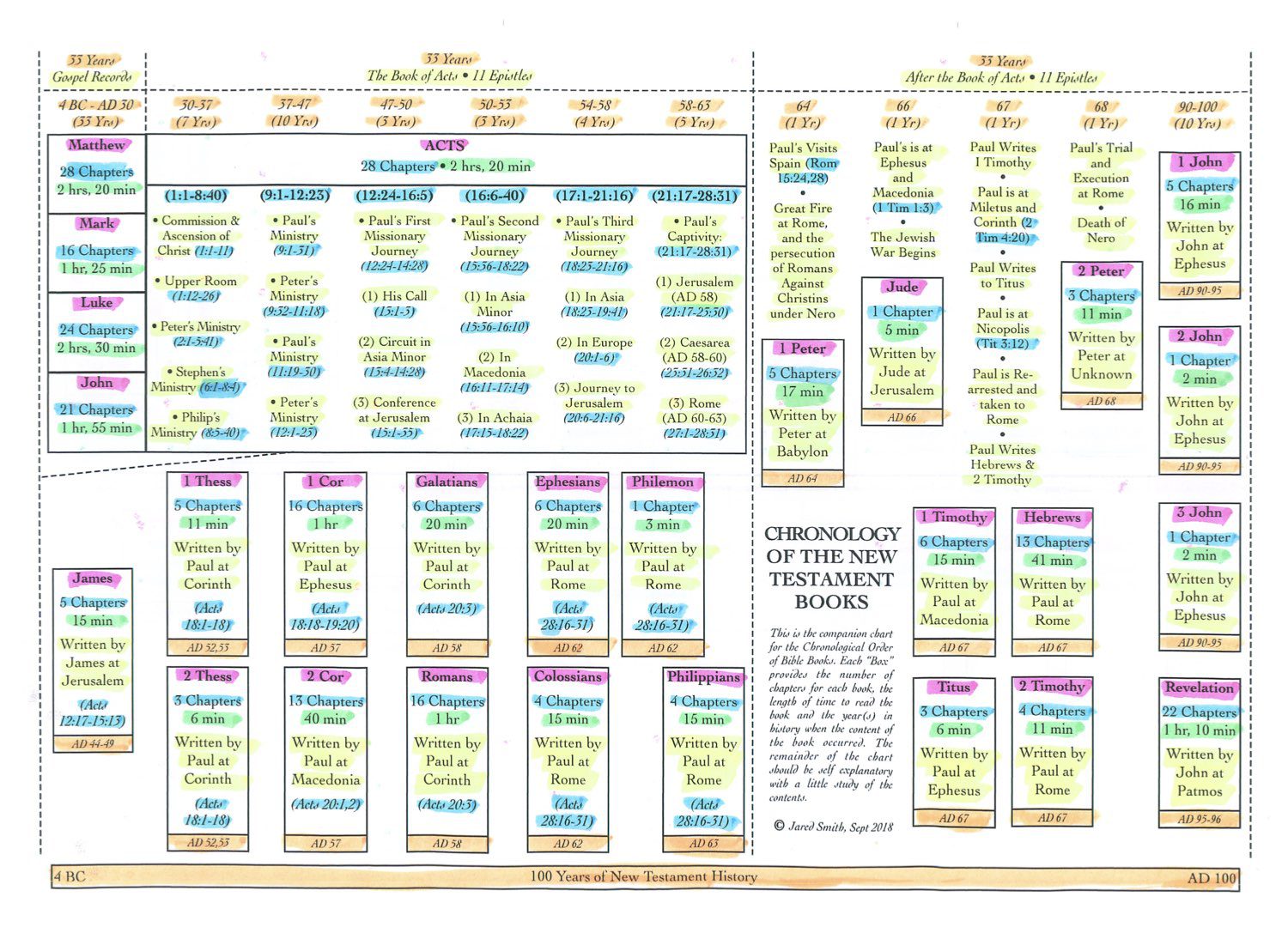
The Letter Of Paul To Philemon
The Background
I believe the letter of Paul to Philemon was written in the year 62AD, making it the ninth of his fourteen epistles. The chart below provides a bird’s-eye view of the chronological order for the books of the New Testament.

John Gill, “Commentary On The New Testament Scriptures”:
“This epistle was written by the Apostle Paul, when a prisoner at Rome, as appears from its inscription and subscription; and seems to have been written at the same time, in the year 60, and sent by the same hand, as the epistle to the Colossians; seeing the same persons were with the apostle at the writing of both, and send their Christian salutations in the one, as in the other; compare (Philemon 1:23,24) with (Colossians 4:10,12,14) and Archippus, the minister in Colosse, is made mention of in both, (Philemon 1:2 Colossians 4:17) and it is very probable that Philemon, to whom it was written, was a Colossian, since Onesimus, his servant, on whose account, and by whom it was sent, is said to be one of the Colossians, (Colossians 4:9). Philemon is said to be one of the seventy disciples, and afterwards Bishop of Gaza; (see Gill on “Luke 10:1”). The occasion of the epistle was this; Philemon’s servant, Onesimus, having either embezzled his master’s goods, or robbed him, ran away from him, and fled to Rome, where the apostle was a prisoner in chains in his own hired house, under the custody of a soldier, and where he received all that came, and preached the Gospel to them, (Acts 28:30) and among those that went to hear him, this fugitive servant was one, and was converted under his ministry; and who not only received the grace of God, but had such gifts bestowed on him as qualified him to be a preacher of the word. Now the design of this epistle is to reconcile Philemon to his servant, and to entreat him to receive him again, not only as a servant, but as a brother in Christ; and the most proper and prudent methods and arguments are used to engage him to it. The epistle, though it is a familiar one, and short, is very instructive; it shows great humility in the apostle, and that he did not think it below him to be concerned in doing such an office as to reconcile a master to his servant, and which is worthy of imitation; as also it teaches the right that masters have over their servants, which is not lost by their becoming Christians, and even ministers of the Gospel; and that recompense should be made unto them for injuries done by them: it likewise displays the riches of the grace of God, in the conversion of such a vile creature: and the wonderful providence of God in overruling that which was sinful in itself, running away from his master, to the greatest good, even the conversion of him; and is an instance of surprising grace: and from hence may be learned, that there is salvation in Christ for the chief of sinners; and that the conversion of them is not to be despaired of. The authority of this epistle was not questioned by the ancient writers, and stands always in their catalogues of the canon of the Scripture; and Marcion the heretic, who either rejected, or changed, or mutilated the rest of the epistles, could not lay his hands on this, because of the brevity of it, as Tertullian and Jerom observe.”
Robert Hawker, “Bible Chapter Summaries And Reflections”:
”This short, but lovely Epistle, must have been written while Paul was a prisoner at Rome: and at that time when he had liberty to receive in his own hired house, all that came to him. Acts 28:30. This seems evident, because Onesimus, on whose account the Apostle wrote to Philemon, then attended Paul’s preaching, and the LORD blessed the word to him. Hence the probable date was Anno 60, though some place it later.
The design of this letter seems to have been, to reconcile Philemon to his runaway servant, Onesimus. The outlines of the subject is in the Epistle. It will not be necessary, therefore, in this place to enlarge upon it. As the Holy Ghost hath classed it among the writings of his inspiration, it will be proper to enter upon the perusal of it in prayer. May the Lord bless it to the glory of God, in our edification, through Jesus Christ.
SUMMARY—The Apostle very affectionately addresseth Philemon, on the Subject of his receiving back his Servant Onesimus, and forgiving him all Wrongs. He opens his Epistle, with his usual Salutation, of Grace, and Peace; and closeth with the same.
REFLECTIONS—READER! do not fail to observe in this short Epistle, short as it is, the wonderful ways and works of God. In the family of Philemon under all the means of grace the heart of Onesimus remains hardened But after his departure and unfaithfulness to his Master the grace of God meets him elsewhere, and the Lord changeth the heart of stone into an heart of flesh. And who of God’s redeemed Ones but can say the same? Blessed Jesus, thou art the Brother born for adversity. Do, thou, Lord receive all thine as those for whom thou hast answered. Praised be a Covenant God in Christ for all his mercies. Amen.”
“All scripture is given by inspiration of God [inclusive of Paul’s letter to Philemon], and is profitable for doctrine, for reproof, for correction, for instruction in righteousness: that the man of God may be perfect, throughly furnished unto all good works.”—2 Timothy 3:16,17
Editor, Jared Smith
The Letter
Paul, a prisoner of Jesus Christ, and Timothy our brother, unto Philemon our dearly beloved, and fellowlabourer, And to our beloved Apphia, and Archippus our fellowsoldier, and to the church in thy house: Grace to you, and peace, from God our Father and the Lord Jesus Christ. I thank my God, making mention of thee always in my prayers, Hearing of thy love and faith, which thou hast toward the Lord Jesus, and toward all saints; That the communication of thy faith may become effectual by the acknowledging of every good thing which is in you in Christ Jesus. For we have great joy and consolation in thy love, because the bowels of the saints are refreshed by thee, brother. Wherefore, though I might be much bold in Christ to enjoin thee that which is convenient, Yet for love’s sake I rather beseech thee, being such an one as Paul the aged, and now also a prisoner of Jesus Christ. I beseech thee for my son Onesimus, whom I have begotten in my bonds: Which in time past was to thee unprofitable, but now profitable to thee and to me: Whom I have sent again: thou therefore receive him, that is, mine own bowels: Whom I would have retained with me, that in thy stead he might have ministered unto me in the bonds of the gospel: But without thy mind would I do nothing; that thy benefit should not be as it were of necessity, but willingly. For perhaps he therefore departed for a season, that thou shouldest receive him for ever; Not now as a servant, but above a servant, a brother beloved, specially to me, but how much more unto thee, both in the flesh, and in the Lord? If thou count me therefore a partner, receive him as myself. If he hath wronged thee, or oweth thee ought, put that on mine account; I Paul have written it with mine own hand, I will repay it: albeit I do not say to thee how thou owest unto me even thine own self besides. Yea, brother, let me have joy of thee in the Lord: refresh my bowels in the Lord. Having confidence in thy obedience I wrote unto thee, knowing that thou wilt also do more than I say. But withal prepare me also a lodging: for I trust that through your prayers I shall be given unto you. There salute thee Epaphras, my fellowprisoner in Christ Jesus; Marcus, Aristarchus, Demas, Lucas, my fellowlabourers. The grace of our Lord Jesus Christ be with your spirit. Amen.
Paul The Apostle (?-68AD) was a sovereign grace Baptist preacher. He was appointed by Christ to serve as an Apostle, sent out to the wider regions of the world ministering the gospel primarily to the Gentiles. He is the author of fourteen New Testament letters—1 Thessalonians, 2 Thessalonians, 1 Corinthians, 2 Corinthians, Galatians, Romans, Ephesians, Colossians, Philemon, Philippians, 1 Timothy, Titus, Hebrews and 2 Timothy.






